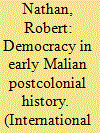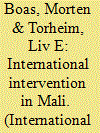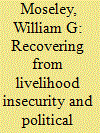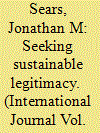| Srl | Item |
| 1 |
ID:
124759


|
|
|
|
|
| Publication |
2013.
|
| Summary/Abstract |
The level of public support for the March 2012 military coup d'état in Mali surprised many observers who viewed the country as a viable democracy and believed its inhabitants perceived it in the same light. This article suggests that, despite this favourable appraisal by certain outsiders, many Malians had low levels of confidence in the democracy of President Amadou Toumani Touré, considering it corrupt and dysfunctional. In light of such attitudes in the present, this article turns toward the past to draw lessons from Mali's history of démocratie de façade. It examines Mali's earliest engagement with democracy in the late colonial era, and the manner in which democratic political discourse was abused by Mali's first postcolonial government. It suggests that Malian leaders' long history of invoking democratic principles for non-democratic aims may have weakened the legitimacy of the government following the 2012 coup d'état, and could make the reestablishment of confidence in Mali's democracy a more challenging task than simply organizing new multi-party elections.
|
|
|
|
|
|
|
|
|
|
|
|
|
|
|
|
| 2 |
ID:
124760


|
|
|
|
|
| Publication |
2013.
|
| Summary/Abstract |
This article critically examines the purposes and objectives of the Organisation internationale de la Francophonie (OIF). While analysts debate whether the OIF is a hegemonic or counter-hegemonic instrument of statecraft, we argue that it is an institution founded upon the principle of geopolitical ownership of a distinctive geocultural space. Its prime task, with regard to conflict resolution, is to help transfer responsibilities and capabilities from northern to southern member states. From this perspective, we contend that the OIF has progressively taken charge of a distinct and necessary geocultural role with regard to international security.
|
|
|
|
|
|
|
|
|
|
|
|
|
|
|
|
| 3 |
ID:
124754


|
|
|
|
|
| Publication |
2013.
|
| Summary/Abstract |
Islamist rebels have retreated from northern Mali; however, a number of challenges for that country remain. The Islamists have gone into hiding but have not surrendered; there is a clear risk of long-term asymmetric warfare. The populations in both northern and southern Mali are divided in their views on the best way forward. The capacities of the Malian government and the Malian armed forces to contain the conflict and retain credible leadership are questionable. This article analyses the Malian crisis with an emphasis on the strategies of key actors, including the Islamist rebels. The consequences of and responses to the conflict are discussed, before the article ends with some tentative conclusions concerning the potential for security in Mali and the Sahel region.
|
|
|
|
|
|
|
|
|
|
|
|
|
|
|
|
| 4 |
ID:
124756


|
|
|
|
|
| Publication |
2013.
|
| Summary/Abstract |
Northern Mali has experienced political instability and a humanitarian crisis since a March 2012 coup d'état, subsequent rebellion and French military intervention. Rebuilding livelihood security in this region will be a key policy objective after a new government has been elected and donor assistance has returned. This policy brief reviews key background on rural livelihoods in northern Mali before exploring current food insecurity in the region as affected by internally displaced people, limited mobility, climate variability, and Tuareg separatism. The article also examines strategies for rebuilding rural livelihoods in the region, from broader security and political initiatives to grassroots interventions.
|
|
|
|
|
|
|
|
|
|
|
|
|
|
|
|
| 5 |
ID:
124757


|
|
|
|
|
| Publication |
2013.
|
| Summary/Abstract |
After 20 years of relative social peace, Mali again faces fundamental challenges. Beyond the need to reestablish security and an administrative presence in the north, the Malian state also needs to establish political legitimacy and moral authority in representing the country's diverse communities. Notwithstanding the country's two decades of democratization supported by international donor-partners, sustainable livelihoods and meaningful citizenship elude many Malians. Mali is a secular, multi-ethnic, and democratic state marked by its social divisions (e.g. regional, urban-rural, and identity-based). Sustainable political legitimacy rests on the sensitive and sensible engagement of state agencies, non-state actors, and donor-partners with the existing social regulations, livelihoods, and identities of Mali's communities.
|
|
|
|
|
|
|
|
|
|
|
|
|
|
|
|
| 6 |
ID:
124755


|
|
|
|
|
| Publication |
2013.
|
| Summary/Abstract |
This article provides a contextualized overview of Tuareg separatism and the violence that has attended it in Mali. The article sketches key episodes and developments in the conflict between the Malian state and Tuareg separatist nationalists, and outlines Tuareg political goals and internal dynamics. The article examines the impact on Tuareg separatism of the presence of international Jihadi-Salafist movements in the region and the resulting intrusion of the so-called "War on Terror" (Overseas Contingency Operations) during the past decade.
|
|
|
|
|
|
|
|
|
|
|
|
|
|
|
|